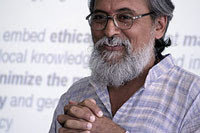While not surprised that innovation was a major theme at the 2009 STEPS Centre Symposium, I was surprised to learn how little innovation is mentioned or critically understood in either the Millenium Development Goals (MDGs) or in global responses to Climate Change. Photo: Anil Gupta by Lance Bellers
The MDGs only mention innovation in regard to information technology. The UNFCCC emphasizes mitigation, adaptation, technology transfer and capacity building. Little emphasis is put on the need for developing countries to innovate. Innovation, if talked about at all, is in the context of developed countries innovating and then transferring that technology to developing countries.
In short, as one participant pointed out, there exists a common assumption that poor countries don’t need to innovate. And too often, imposed innovation can become yet another form of imperialism.
Of course, innovation happens in poor countries all the time. Anil Gupta, founder of the Honey Bee Network, pointed to dozens of practical innovations by poor people for poor people that scientists in labs have never dreamed about.
In considering the lack of innovation in major international discussions from the MDGs to Climate Change, I wondered, are we afraid of innovation? For all that innovation pervades Western public policy discussions as a silver bullet for future growth, this distinct avoidance of innovation for developing countries hints at a darker shadow to those discussions.
Perhaps the better question is, whose innovation are we afraid of? Innovation hinges upon that fundamental human capacity to be the Creator, shaping and transforming objects, patterns of living, and even peoples lives. To be a Creator is to have power. When innovations are taken to the marketplace, that power of creation can turn into financial power – a domain that many wish to keep for themselves.
By keeping developing country’s ability to innovate off the agenda, dominant powers consciously or unconsciously keep at least some of that power to themselves. Or at least, they try to do so. Humans are inherently creative and innovative, no matter where they are. People will continue to innovate, creating and re-creating their lives. But the longer such basic human nature is ignored, the longer it will take for us the rest of us – no matter where we are – to learn from and benefit from everyone’s innovations.
